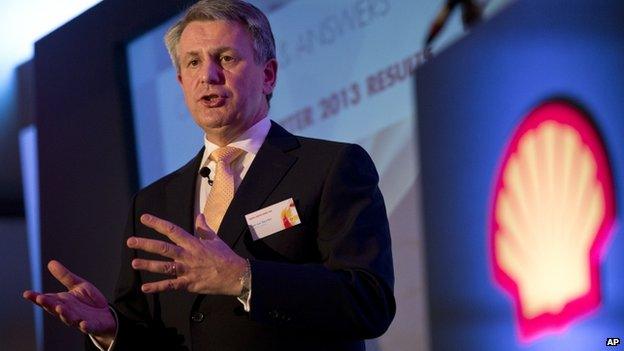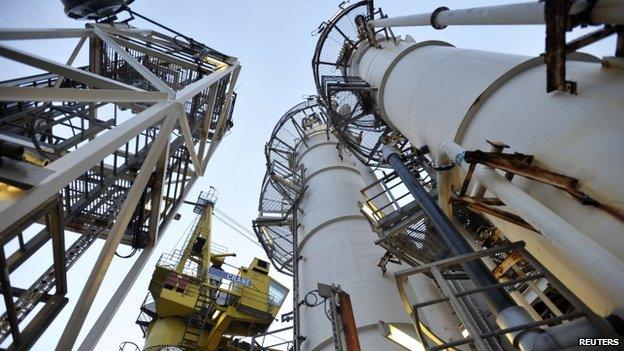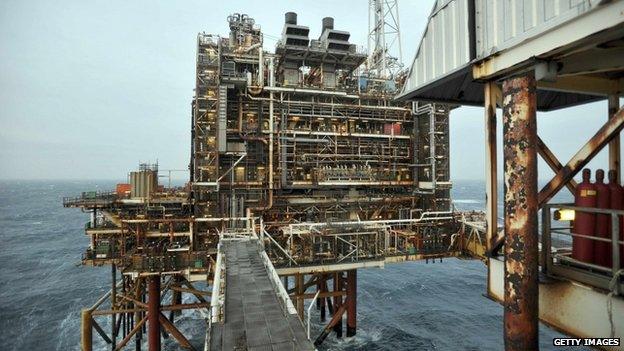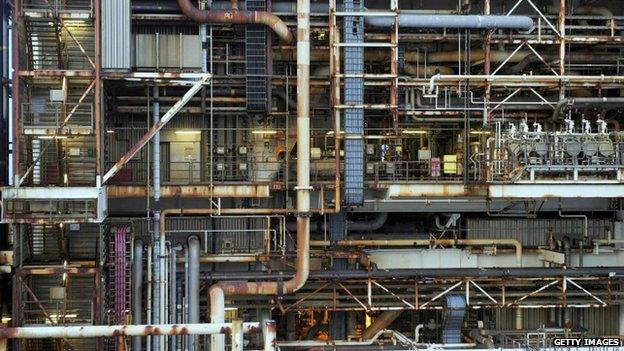Scottish independence: Shell boss wants Scotland to 'remain in UK'
- Published

Mr van Beurden also said he supported the UK staying in the EU
The chief executive of the oil company Shell has said he would like Scotland to "remain part of the UK".
Addressing the company's annual reception in London on Wednesday, Ben van Beurden said he valued the "continuity and stability" of the UK.
He said the company had reached this view for the same reasons it supported the UK staying "inside the EU".
The Scottish government said an EU referendum was the "real risk" facing the oil and gas sector.
Last week, Shell hosted the UK cabinet at its headquarters in Aberdeen.
At the time, the chairman of Shell UK, Ed Daniels, said the independence debate was "a matter for Scottish people" and that "it would be wrong" for Shell to intervene.
Mr van Beurden's view on independence came on the day Lloyds Banking Group and Barclays both cited the Scottish independence referendum as a potential risk to their businesses.

The future of North Sea oil and gas has been a major campaign battleground

Billions of barrels of oil have been extracted from the North Sea

The industry is predicted to generate £57bn in tax revenue by 2018
In their annual reports, the banks listed the referendum alongside a raft of other perceived risks from the UK, Europe and across the world.
In his speech, Mr van Beurden said one of the "many things" the company valued about the UK was the "continuity and stability" it offered.
He added: "Yes, we're used to operating in uncertain political and economic environments. But, given a choice, we want to know as accurately as possible what investment conditions will look like 10 or 20 years from now.
"That's the chief reason we're in favour of the UK maintaining its long-established place at the heart of the European Union: it provides greater investment stability and certainty.
"But, as a global business with feet planted firmly on both sides of the Channel, we also believe that the UK's national interests are best served by a close relationship with Europe.
"The continent faces medium-term challenges - not least relating to its economic competitiveness. But we believe those challenges are best tackled - to the benefit of all - with the UK's voice loudly expressed and loudly heard inside the EU.
"It's for similar reasons that we'd like to see Scotland remain part of the United Kingdom.
"Shell has a long history of involvement in the North Sea - and therefore in Scotland - and we continue to invest more than a billion pounds there every year."
A spokeswoman for the Scottish government said: "The Scottish government agree with Shell that the real risk facing the oil and gas sector is the proposed in-out referendum on EU membership, which risks taking Scotland out of Europe with all the consequences for jobs, investment and prosperity that would entail.
"We would be happy to meet with Shell to discuss the future of the oil and gas industry in an independent Scotland.
"As Ed Daniels, chairman of Shell UK has acknowledged, the independence debate is a matter for the Scottish people. A recent Oil and Gas People poll showed that in fact, 70% of oil workers planned to vote for independence.
"Industry has significant confidence in the opportunities presented in the North Sea. Combined, operators, including Shell, have around £100bn worth of investment planned for the North Sea. And with more than half of oil and gas reserves by value still to be extracted, that investment will continue after independence.
North Sea oil in numbers
40bn
barrels extracted
24bn
could remain
-
30-40 years of production remaining
-
£57bn tax revenue predicted by Scottish Government by 2018
-
38% fall in oil revenue predicted by Office for Budget Responsibility by 2017-18
"Shell is a company which already operates in more than 40 independent countries around the globe, and an independent Scotland with full control of its economy and huge resources will offer an attractive and stable environment for businesses in the offshore and other sectors."
Mr van Beurden's comments come after BP's chief executive, Bob Dudley, said he personally believed Britain "ought to stay together".
Speaking in response to Mr Dudley's remarks, Scottish First Minister Alex Salmond said he was "entitled to his personal opinion" but added that many other chief executives were firmly in favour of independence.
Interviewed on BBC Breakfast last month, BA group chief executive Willie Walsh said he thought Scottish independence would be a "positive development" for the company as he believed a Scottish government would abolish air passenger duty.
'Big problems'
A spokesman for the pro-Union campaign Better Together said the latest big business interventions in the referendum debate showed independence would "cost jobs".
He added: "Shell is now the second key North Sea investor in a few weeks to call for Scotland to stay in the UK, following the intervention from BP's chief executive Bob Dudley.
"The best way to preserve jobs and to make the most of depleting North Sea oil and gas reserves, without allowing the volatility of the tax we get risking public services, is to take advantage of the broad shoulders of the larger UK economy.
"What we have seen in recent days is some of the largest employers and investors in Scotland outline big problems with Alex Salmond's independence obsession."


BBC analysis

James Cook, BBC Scotland correspondent: "There is the battle of Britain and then there is the battle of Brussels.
"One is nearly upon us but the other may not be that far off, and both are exercising business.
"Scotland will vote on leaving the United Kingdom on September 18 and, if the Conservatives win the 2015 general election, David Cameron says Britain will vote on leaving the European Union before the end of 2017.
"Campaigners for independence say too little attention has been paid to the latter possibility.
"They point to comments from the chief executive of the engineering giant, GKN, Nigel Stein, who said this week that Scottish independence would make no difference to his company while the prospect of leaving the EU would be "deeply harmful".
"But opponents of independence point to a string of companies which appear less relaxed about the prospect of Scottish secession. Bosses from Standard Life, BP, RBS and Lloyds have all raised concerns in recent weeks.
"In the boardrooms, both battles are getting into full swing.
"Their outcome will shape the future of Scotland, Britain and Europe."


Glenn Campbell, BBC Scotland political correspondent: "When Shell hosted David Cameron's cabinet in Aberdeen last week, the company's UK chairman, Ed Daniels, stressed that the decision on independence was for Scottish voters and that it would be "wrong" for Shell to intervene in the debate.
"It seems that the chief executive of the global company takes a different view.
"In scripted remarks to those attending Shell's annual reception in London, Ben van Beurden made clear that he would prefer Scotland to "remain part of the UK" and for the UK to stay in the European Union.
"Most of his comments addressed the EU dimension ahead of elections to the European Parliament in May and a possible in/out referendum on UK membership in 2017.
"The Scottish government said this was the "real risk" to jobs , investment and prosperity in the North Sea and offered to meet Shell to discuss its plans for Scottish independence within the EU.
"It has set up an expert commission to review the tax and regulation options for the oil and gas sector in the event of a "yes" vote in September's independence referendum.
"The chief executive of BP, Bob Dudley, previously said he personally thought Britain "ought to stay together". Shell's boss appears to have expressed a corporate view.
"While Mr van Beurden made Shell's constitutional preferences clear, he also pointed out that the company works in far less stable political and economic environments around the world and said it continues to invest around a billion pounds a year in North Sea oil and gas operations."